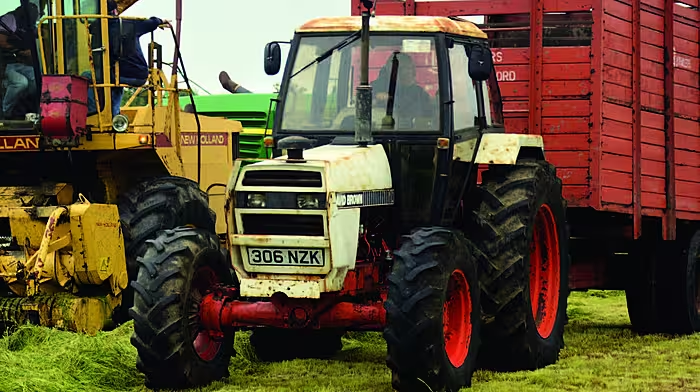He's back. Little Dev, otherwise known as Fianna Fáil's Eamon Ó Cuív, one-time deputy leader of the Soldiers of Destiny, occasional minister for assorted Departments in happier times and Mickey Martin's nemesis.
HE’S back. Little Dev, otherwise known as Fianna Fáil’s Eamon Ó Cuív, one-time deputy leader of the Soldiers of Destiny, occasional minister for assorted Departments in happier times and Mickey Martin’s nemesis.
In other words, The Long Fellow’s grandson is showing all the signs that he just might become the inescapable agent of the political downfall of the largely ineffectual Martin.
Little Dev’s timing is perfect. At the very moment that the Fine Gael government announces the proposed launch of a major ‘plan’ that sets out the priorities to guide regional, local, planning and investment decisions for the next 20 years (the National Planning Framework), Ó Cuív lets fly with a scud missile.
‘What is this plan?’ he barked. ‘Is it a plan for an economy or for a country?
‘It pushes resources into urban areas and expects people to follow the resources; and it will kill rural Ireland when the quality of life for our citizens should be the ultimate measure.’
What’s more he has the support of a disparate collection of TDs within Fianna Fáil, Sinn Féin and Labour, whose Alan Kelly dryly remarked: ‘We can’t choke up Dublin and turn the North West of Ireland into somewhere in outer space.’
Sinn Féin’s Eoin Ó Broin also demanded substantial changes.
In Fine Gael-speak, the plan will address the ‘future development direction of cities, towns and rural areas, coastal and marine areas, climate change, rural development, the need for 666,000 additional jobs and half a million homes by 2040, and the regeneration of rural Ireland by promoting environmentally sustainable growth patterns in terms of jobs and prosperity.’
Oh, and it also is designed to enable people ‘to live closer to where they work, moving away from the current unsustainable trends of increased commuting and to secure more compact forms of urban development in all types of settlements.’
An impressive enterprise, indeed! But, as sure as eggs are eggs, Little Dev – who is quite a literary gent – is sure to have muttered: ‘if you can swallow all of that, you’re a better man than I am, Gunga Din!’ (as Kipling sort of said in the famous poem).
Little interest
So far, to judge by the political response, the Plan has done little to interest parties other than the Blueshirts and, far from offering a vista of milk and honey and a utopia of abundance where country people can make money easily, it has the potential to accentuate even more the divide between rural and city life.
Basically, it has the signs of another multi-million euro Fine Gael shambles, a pathetic public relations exercise that is to be dumped on the plain people of Ireland under the guise that it is the next best thing since sliced pan (or as King Leo might put it, the best thing since a sliced artisan hand-baked organic bloomer).
In the meantime, the F&Fers, and particularly the Ó Cuív camp, are pouring scorn on King Leo’s Great Plan. And – here’s a good one – the contempt and derision is such that Mickey Martin’s ‘Confidence and Supply’ arrangement with Fine Gael, which ensures that Blueshirts and their rag-bag Independent allies stay in power, might well be threatened.
Is Ó Cuív’s response to the Plan part of a strategy to end his party’s shameful collaboration with Fine Gael and oust Martin from leadership of Fianna Fáil? The doomsday situation could happen if Ó Cuív prevails on dyed-in-the-wool, horny-handed, rural Fianna Fáil deputies not to support the final report when it comes before the Dáil.
Let’s not forget either that, not too long ago, Ó Cuív and Martin were at daggers drawn. Ó Cuív, a former FF deputy leader, was perceived as ‘a rebel’ who implicitly criticised Martin’s leadership with forthright comments relating to low party morale and ‘an absolute collapse in self-belief.’
As well, during the FF upheaval over the Fiscal Compact Treaty referendum, intense speculation surrounded Ó Cuív’s political future, especially in his Galway West constituency. Some said he was on the point of splitting from the party to become an independent; others that he intended to lead a breakaway faction of Fianna Fáil.
FF underlings
The stormy waters eventually died down as Martin successfully managed to condition his party into accepting its role as a mud-guard to Fine Gael (a humiliating function on the crocked bicycle of government). But, while some Soldiers of Destiny resent seeing their noble party becoming a sort of Fine Gael-lite, others still seethe with barely concealed loathing for Mickey because of the way Fianna Fáil became a collection of foot soldiers at the beck and call of Fine Gael.
But whether or not Ó Cuív could ever wrest the leadership from Martin’s grasp is problematic. Party stalwarts are not convinced that Ó Cuív is the best person to replace Martin, particularly since the deputy’s popularity drifts more towards the sons of the soil than to city slickers.
But the alternative stalking horse, Michael McGrath, is equally unpalatable. While McGrath, gleams with urban sophistication and knows his way around Douglas Shopping Centre, he remains an unknown quantity to the Turf Goblin wing of the party.
Them ’n’ us
And now for something different…
Fair dues to the ladies in Iran who defiantly took off their black headscarves on busy streets in Tehran and held them aloft on sticks. They explained to passers-by that they were proud Muslims but were protesting at being forced to wear a hijab, which should be a personal matter.
The hijab, they said, was being used as a means for applying social pressure on women and girls in regards to religion and should not be the business of the politicians. Failure to wear the hijab in public can lead to two months imprisonment, a fate that now lies in store for the protestors.
The award-winning novelist, lawyer, human rights advocate and Muslim, Randa Abdel-Fattah, ably described the effect of wearing the hijab on other people: ‘They look at it (the hijab) as if it has bizarre powers sewn into its microfibers. Powers that transform Muslim girls into UCOs (Unidentified Covered Objects), which turn Muslim girls from an ‘us’ to a ‘them.’’
De burka!
Oddly enough, feminists in this country were disappointingly subdued in their response to the struggle in Iran, with few expressions of solidarity or support. However, perhaps Iranians can take heart from the historical achievements of their suddenly reticent sisters in Ireland, such as the watershed case of De Burca v Attorney General.
In 1972 Ms De Burca won for Irish women the right to serve on juries. Is it not a strange coincidence that this case shares its name with the very piece of clothing in question in Iran? Yes. It’s what Leesiders would call de burka!







